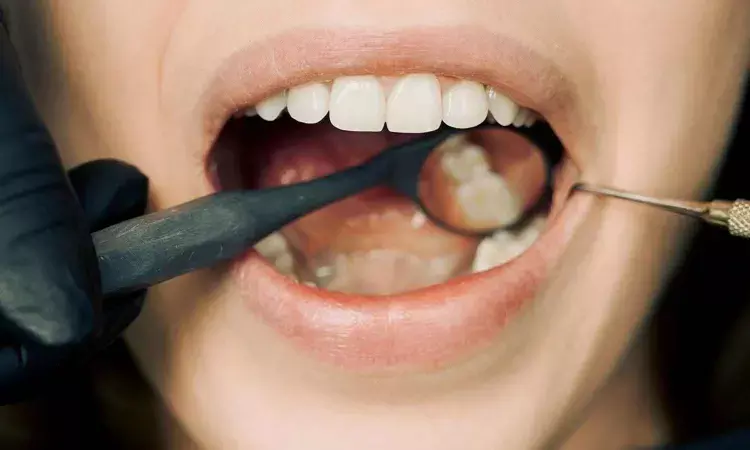- Home
- Medical news & Guidelines
- Anesthesiology
- Cardiology and CTVS
- Critical Care
- Dentistry
- Dermatology
- Diabetes and Endocrinology
- ENT
- Gastroenterology
- Medicine
- Nephrology
- Neurology
- Obstretics-Gynaecology
- Oncology
- Ophthalmology
- Orthopaedics
- Pediatrics-Neonatology
- Psychiatry
- Pulmonology
- Radiology
- Surgery
- Urology
- Laboratory Medicine
- Diet
- Nursing
- Paramedical
- Physiotherapy
- Health news
- Fact Check
- Bone Health Fact Check
- Brain Health Fact Check
- Cancer Related Fact Check
- Child Care Fact Check
- Dental and oral health fact check
- Diabetes and metabolic health fact check
- Diet and Nutrition Fact Check
- Eye and ENT Care Fact Check
- Fitness fact check
- Gut health fact check
- Heart health fact check
- Kidney health fact check
- Medical education fact check
- Men's health fact check
- Respiratory fact check
- Skin and hair care fact check
- Vaccine and Immunization fact check
- Women's health fact check
- AYUSH
- State News
- Andaman and Nicobar Islands
- Andhra Pradesh
- Arunachal Pradesh
- Assam
- Bihar
- Chandigarh
- Chattisgarh
- Dadra and Nagar Haveli
- Daman and Diu
- Delhi
- Goa
- Gujarat
- Haryana
- Himachal Pradesh
- Jammu & Kashmir
- Jharkhand
- Karnataka
- Kerala
- Ladakh
- Lakshadweep
- Madhya Pradesh
- Maharashtra
- Manipur
- Meghalaya
- Mizoram
- Nagaland
- Odisha
- Puducherry
- Punjab
- Rajasthan
- Sikkim
- Tamil Nadu
- Telangana
- Tripura
- Uttar Pradesh
- Uttrakhand
- West Bengal
- Medical Education
- Industry
Using custom abutments and permanent cement tied to better retention of zirconia and metal-ceramic single crowns: Study

Using custom abutments and permanent cement tied to better retention of zirconia and metal-ceramic single crowns suggests a study published in the Clinical Oral Implant Research.
A study was done to evaluate the effect of different cement types on the incidence of failure and loss of retention of zirconia and metal-ceramic single crowns (SCs) cemented on implant abutments. They placed 567 implant-supported SCs in 358 patients and retrospectively evaluated long-term retention for up to 12.8 years. The frameworks were made from metal alloy (n = 307) or zirconia (n = 260). SCs were cemented with permanent (glass-ionomer cement; n = 376) or semipermanent cement (zinc oxide non-eugenol cement; n = 191) on standardized (n = 446) or customized (n = 121) abutments. Kaplan–Meier curves were used to calculate the incidence of decementation. Differences between survival curves were assessed with log-rank tests. Cox-regression analysis was performed to evaluate multiple risk factors.
Results: Of the 567 SCs, 22 failed because of technical complications and four because of implant loss. Loss of retention was observed in 50 SCs. Analysis revealed a 7% probability of loss of retention for zirconia and 16% for metal-ceramic SCs after 10 years (p = .011). After 5 years, loss of retention was higher for standardized abutments than for customized abutments (p = .014). The probability of loss of retention was higher with semipermanent than with permanent cement (p = .001). Cox-regression analysis revealed semipermanent cement as the only significant risk factor for SC failure (p = .026). In contrast to semipermanent cement, permanent cement provides acceptable long-term retention of cemented implant-supported SCs. These possible positive effects of customized abutments have to be controlled with larger sample sizes.
Reference:
Rammelsberg, P., & Klotz, A. L. (2024). Long-term retention and survival of cemented implant-supported zirconia and metal-ceramic single crowns: A retrospective study. Clinical Oral Implants Research, 00, 1–8. https://doi.org/10.1111/clr.14321.
Dr. Shravani Dali has completed her BDS from Pravara institute of medical sciences, loni. Following which she extensively worked in the healthcare sector for 2+ years. She has been actively involved in writing blogs in field of health and wellness. Currently she is pursuing her Masters of public health-health administration from Tata institute of social sciences. She can be contacted at editorial@medicaldialogues.in.
Dr Kamal Kant Kohli-MBBS, DTCD- a chest specialist with more than 30 years of practice and a flair for writing clinical articles, Dr Kamal Kant Kohli joined Medical Dialogues as a Chief Editor of Medical News. Besides writing articles, as an editor, he proofreads and verifies all the medical content published on Medical Dialogues including those coming from journals, studies,medical conferences,guidelines etc. Email: drkohli@medicaldialogues.in. Contact no. 011-43720751


